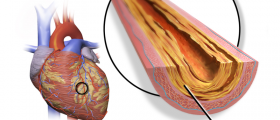Triglycerides are the types of fat in the blood, which can increase the chances of having cardiovascular diseases. If you eat too much and take more calories than you need, the body transforms redundant calories into triglycerides.
The level of the triglycerides can be determined with a simple blood test. The blood test will include the cholesterol level as well. The difference between triglycerides and cholesterol is that triglycerides supply the body with energy and cholesterol is responsible for particular hormones and cells.

Dangers of High Triglycerides Levels
If the test has shown the high level of triglycerides, you may be at risk of heart attack and stroke because high triglycerides can make your arteries and their walls thick. In some cases the high level of triglycerides is the sign of diabetes, kidney disease, thyroid gland problem or liver disease.Also, high triglycerides may appear as a side effect of some medications such as contraception pills, diuretics, but blockers or steroids. High triglycerides usually mean that there are some other health issues which can lead to heart diseases. If you are overweight, have high blood pressure, high level of sugar in the blood and high cholesterol, beside high triglycerides, you should seek advice from your doctor and consider changing your lifestyle.
- Diet with high positive energy-intake balance and high fat or high glycaemic index.
- Increased alcohol consumption (hypertriglyceridaemia risk increases with > 2 and > 1 drink(s) per day in men and women, respectively).
- Obesity.
- Metabolic syndrome.
- Insulin resistance.
- Diabetes mellitus (predominantly Type 2).
- Hypothyroidism.
- Renal disease (proteinuria, uraemia, or glomerulonephritis).
- Pregnancy (particularly in the third trimester).
- Paraproteinaemia.
- Systemic lupus erythematosis.
- Medications, including corticosteroids, oral oestrogen, tamoxifen, thiazides, non-cardioselective beta-blockers and bile acid sequestrants, cyclophosphamide, L-asparaginase, protease inhibitors, and second-generation antipsychotic agents (such as clozapine and olanzapine).
Treatment Options for High Triglycerides
The best treatment for the high level of triglycerides is healthy lifestyle. The first thing you should do is lose weight because it will also give you energy and improve your health condition. It is important to reduce the amount of calories because they are responsible for triglycerides in your blood. Do not eat sugar, food made with white flour, greasy and red meat, whole milk products and yolks.
Also avoid fried food, cookies and products which contain trans fat. In addition, do not drink alcohol because it has a lot of calories. You should include olive, canola and peanut oil in your diet. It is also recommended to eat fish rich in omega-3 fatty acids. Moderate exercises are also good for fighting against high triglycerides. You should exercise every day at least for ten minutes.
Medications for Lowering High Triglycerides
There are also medications which can help you lower the level of triglycerides. One of the medications is gemfibrozil which is excellent for treating triglycerides but has no affect on other problems such as cholesterol. Another medication is fenofibrate which is very effective in lowering high triglycerides.People whose level of triglycerides is just above the normal should consider taking statins, such as lovastatin, fluvastatin, pravastatin, simvastatin or atorvastatin. Niacin is recommended for high level of triglycerides, but some people can suffer from this side effects, such as liver damage.

















Your thoughts on this
Loading...